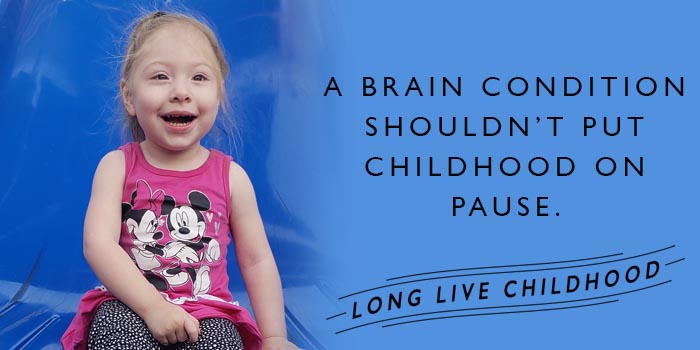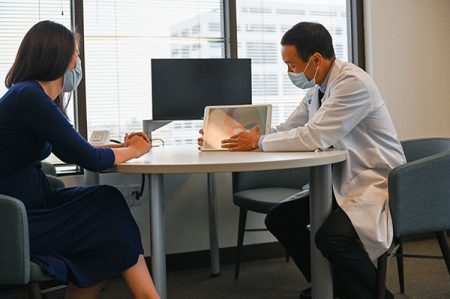Encephalocele
When your child is born with encephalocele, the excitement of having a baby can turn to worry. At CHOC, we understand that you will have many questions, and we are here to support your child and your family, every step of the way. Our team of specialists will be with you from the birth though surgery, and continuing into your child’s future to ensure the best outcome.
What is encephalocele?
Encephalocele is a protrusion of brain matter, fluids and the covering membrane from an opening in an infant’s skull caused by the incomplete closure of the neural tube during pregnancy. During pregnancy, a fetus develops a narrow channel called a neural tube that folds and closes to form the brain and spinal cord. When the neural tube does not fully close the brain grows beyond the skull and protrudes from that opening. The protrusion is usually seen in the back of the head or near the nose. This is a very rare disease, with around 340 babies born in the U.S. with the disorder each year.
What are the causes of encephalocele?
Encephalocele causes are unknown, but the lack of a B vitamin called folic acid during pregnancy could be a contributing factor.
How is encephalocele diagnosed?
Encephalocele can be diagnosed during pregnancy, or it becomes clear upon birth. However, there are times when the protrusion is small enough that it goes undetected for some time.
What are the symptoms of encephalocele?
Encephalocele symptoms your child may encounter include:
- An accumulation of cerebrospinal fluid in the brain (hydrocephalus)
- An abnormally small head for the child’s age and sex (microcephaly)
- Neurologic problems
- Possible paralysis of limbs
- Vision problems
- Intellectual disability
- Stunted growth
- Seizures
- Developmental delays
Infants born with encephalocele will require care from a hospital close to home, for safety and for practical reasons. Beyond the initial surgical treatment to repair the protrusion and opening, your child will require multiple follow-up visits as they grow.
Encephalocele Types
Encephalocele is typically classified by the contents of the sac-like protrusion and its location along the skull. The two types of encephalocele based on protrusion contents include:
- Meningocele: The bulge through the skull is made up of spinal fluid and usually doesn’t cause major problems.
- Meningoencephalocele: The sac like bulge that pokes through the opening in the skull has brain tissue and spinal fluid. This type of encephalocele is more serious and can cause long term neurological (brain) problems.
The two types of encephalocele based on protrusion location include:
- Occipital: located at the back of the head. They are more common in girls. Children that live with occipital encephaloceles often have delays in development, balance and coordination problems, hydrocephalus, and seizures.
- Frontonasal: located between the nose and forehead. They are more common in boys. Survival rates for babies with this type of encephalocele is very good. They are at risk of less severe neurological problems.
Encephalocele Treatment and Surgery
A child with encephalocele will need surgery to place the protruding matter back into the skull and close the opening. The length of surgery will depend on the case and location of the protrusion. Multiple surgeries may be needed. CHOC will have a team of specialists including neurosurgeons, nurses, plastic surgeons and others, working diligently to treat your child.
Why CHOC? Treating Encephalocele at CHOC
As a parent, we understand your top priority is choosing a hospital and team of doctors that will bring the best outcome for your child and family as possible.
- The neonatal intensive care unit (NICU) at CHOC is one of a select few in the U.S. rated as a Level 4—the highest rating available—by the American Academy of Pediatrics.
- We practice a team approach to healing. Neurological conditions in children require a team of caregivers including neurologists, orthopedic specialists, nurses, social workers, rehabilitation therapists and others. Our team works together on every aspect of your child’s care from diagnostics to surgery and follow-up care.
- We understand that a hospital can seem frightening for both your child and your family. Our child life specialists work with families to normalize hospital equipment and procedures so you can concentrate on healing instead.
- Our surgical center is outfitted with advanced imaging, communications, and robotics technologies, specific to children and their needs. This ensures a high level of proficiency and safety for the children under our care.
Encephalocele Follow-Up Care
Lasting effects of encephalocele depend on each case. Historically, children with a protrusion on the front of the skull have fewer neurological effects than those with a protrusion at the back of the skull. Neurological issues occurring before surgery will likely continue after the surgery and recovery.
CHOC will follow your child throughout their life, from birth to surgery to recovery and beyond, with regular checkups to ensure the best possible outcome for your child.
Treating Encephalocele at CHOC
As a parent, we understand your top priority is choosing a hospital and team of doctors that will bring the best outcome for your child and family as possible.
- The neonatal intensive care unit (NICU) at CHOC is one of a select few in the U.S. rated as a Level 4—the highest rating available—by the American Academy of Pediatrics.
- We practice a team approach to healing. Neurological conditions in children require a team of caregivers including neurologists, orthopedic specialists, nurses, social workers, rehabilitation therapists and others. Our team works together on every aspect of your child’s care from diagnostics to surgery and follow-up care.
- We understand that a hospital can seem frightening for both your child and your family. Our child life specialists work with families to normalize hospital equipment and procedures so you can concentrate on healing instead.
- Our surgical center is outfitted with advanced imaging, communications and robotics technologies, specific to children and their needs. This ensures a high level of proficiency and safety for the children under our care.
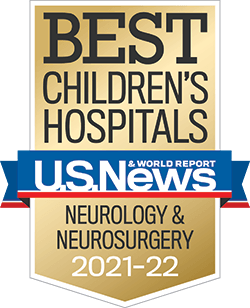
The Fetal Care Center of Southern California
Meet Our Pediatric Neurosurgeons
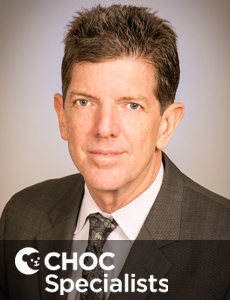
Loudon, William G. MD, PhD
Specialty:
Neurosurgery
Appointments: 714-509-7070
Dr. William Loudon is a board-certified pediatric neurosurgeon at CHOC Hospital.

Muhonen, Michael G. MD
Specialty:
Neurosurgery
Appointments: 714-509-7070
Dr. Michael Muhonen is a board certified neurosurgeon at CHOC, treating babies, kids and teens with neurological disorders.
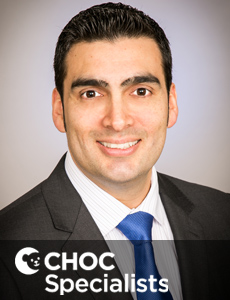
Olaya, Joffre E. MD
Specialty:
Neurosurgery
Appointments: 714-509-7070
Dr. Joffre Olaya specializes in neurosurgery. He sees kids and teens at CHOC Hospital in Orange and CHOC at Mission Hospital.

